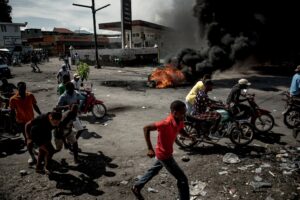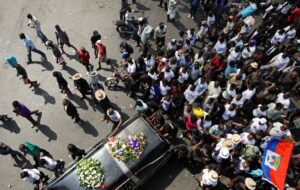
Photo courtesy Meridith Kohut/The New York Times
Haiti is the third largest country in the Caribbean and it is also the poorest country in the Western hemisphere. Once considered an ally to the United States, Haiti is on the brink of collapse and it’s yet to be seen if a rebound to prominence is capable.
To be completely honest, Haiti is dying. Most people worldwide aren’t even aware of the violent protests sweeping the country.
An article was recently published by The New York Times where author Kirk Semple dove into the impossible conditions that citizens live through and how the streets are marred by violence and civil unrest all clamoring for the resignation of the president.
“The current crisis is a culmination of more than a year of violent protests, and the product, in part, of political acrimony that has seized the nation since [President Jovenel] Moïse, a businessman, took office in February 2017 following an electoral process that was marred by delays, allegations of voter fraud and an abysmal voter turnout,” Semple wrote.
The country has been in a free-fall since the deadly earthquake that struck in 2010 followed by a cholera outbreak that hit the country and sustained until about 2015.
On Jan. 12, 2010, one of the most destructive national disasters in human history devastated Haiti where former Haitian Prime Minister Jean-Max Bellerive said the death toll was over 300,000. Unfortunately, another 740,000 were affected by the cholera outbreak due to dirty water that same year, killing more than 8,900 people.
Corruption is one of the commonly used descriptions associated with the Haitian government; according to the aforementioned article, the government embezzled billions that was meant for social reform projects that were designed to weather the decaying of the republic, causing uproar within the country and demanding his resignation.
According to Transparency International, an organization that monitors corruption around the world, Haiti is ranked at the 159th spot; Somalia is ranked 17 spots under Haiti to be known as the most corrupt country in the world.
“Outrage over allegations that the government misappropriated billions of dollars meant for social development projects provided the initial impetus for the protests,” wrote Semple, “but opposition leaders have sought to harness the anger to force his ouster, calling for his resignation and the formation of a transitional government.”
My father, Enock Edouard, travels regularly to and from Haiti and I never understood his infatuation for his home country. At the age of 57, he has traveled back to Gonaïves more than a dozen times within my lifetime and continues to do so to this day.
He claims the country has never been through anything of this magnitude. Over the last two months, approximately 144 people have died during the protests calling for President Moïse’s job.

Photo courtesy Andres Martinez Casares/ The NewYorker
“It’s nothing I’ve seen before and it’s gotten worse over the two months,” said Edouard. “People are trying to get the president [Moïse] to step down because he hasn’t lived up to the things he said he would do …144 people have died since this all started.”
Any average afternoon in Haiti would shake the core of any person if they viewed the conditions citizens have to tolerate because of the lack of financial stability. Being a child of two Haitian parents, my parents always tried to shield me and my siblings from the reality that was the misfortunes of their homeland.
“Haitian children are prone to deaths, as more than 10 percent of them die before reaching the age of 5. Half of its children are unvaccinated,” according to thefactfile.org. The world tends to be sensitive to children; the fact that newborns are dying because there’s not enough oxygen in a hospital to support them in such a fragile state speaks volumes to the situation at hand.
The living conditions in the country are suspect and would have you questioning the health of the citizens considering the infrastructure of Haiti has decreased in quality over the past decade. The citizens blame President Moïse for the conditions.
“Ms. Jules, three of her five children and a cousin live in a narrow house in La Savane made from mud and stone. The corrugated metal roof leaks when it rains. The bathroom is an outhouse with a hole in the ground. With no running water, the family has to fill buckets at a public tap several blocks away,” wrote Semple.
The world seems to be quiet when it comes to Haiti with little to no media coverage about the protest, but as the citizens of the republic of Haiti remain, the objective will always be the same: surviving the day and the hopeful advancement of Haiti.
“It’s not only that we’re hungry for bread and water,” said Stamène Molière, 27, a secretary from Les Cayes. “We’re hungry for the development of Haiti.”